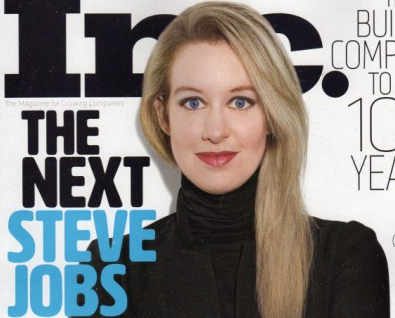The Theranos Effect: The Bewitched, Bothered and Bewildered Edition
This past week, Theranos founder and Steve Jobs wannabe Elizabeth Holmes was charged with “massive fraud” by the Securities and Exchange Commission. She agreed to pay a $500,000 penalty, be barred from serving as an officer or director of a public company for 10 years, and returned 18.9 million shares she amassed during the alleged fraud.
The company, which raised more than $700M in funding, was “deceiving investors by making it appear as if Theranos had successfully developed a commercially-ready portable blood analyzer” that could perform a full range of laboratory tests from a small sample of blood…But in reality, we allege that after years of development, Theranos was able to process just a small number of blood tests upon its proprietary analyzer, and instead conducted the vast majority of its patients’ tests on modified commercial analyzers that were manufactured by others,” Steven Peikin, the SEC’s co-director of enforcement, told reporters, according to USA Today.
Those are the details, and then there are the questions:
How did Holmes manage to defraud her investors and customers? Where was the due diligence? Theranos was a unicorn and Holmes a billionaire on paper, with $100+k in annual sales in 2014. Meaning that revenues that year were exaggerated by nearly $100M.
How is it that an industry based on zeroes and ones is so bad with numbers?
Amazon
To wit, as Bloomberg notes, “Amazon makes no sense…It’s the third-most-valuable company on Earth, with smaller annual profits than Southwest Airlines Co., which as of this writing ranks 426th. Chief Executive Officer Jeff Bezos is the world’s richest person, his fortune built on labor conditions that critics say resemble a Dickens novel with robots.”
Uber
Adam Townsend points out Uber. BS earnings. Tech journalists didn’t do forensics. So I did and herein lies the rub. “Uber knows propaganda. Their narrative is that their valuation is justified by a powerful business model based on cutting-edge technological innovation; it has created a totally new product category (“ridesharing”) an industry (the “on-demand”) and startup losses will soon be strong profits, ‘just like Amazon.’ It’s a narrative that exploits the myopia of tech journalists embedded in a Silicon Valley tribal culture and focused on the wealth and status of Uber’s venture capital allies.
“Is Uber artificially inflating its top-line revenue growth claims?” Townsend continues. “If Uber offered discounts, the higher fare (that the passenger did not pay) appears to be included in gross revenue, while the promotional discount is a separate offset. These numbers do not affect bottom line P&L calculations, but inflating the top-line gross revenue number directly supports Uber’s desire to show the strongest possible passenger demand numbers.”
Silicon Valley math and perhaps yet another unicorn on paper, or more accurately, how much of it is due to smoke, mirrors and as Townsend calls them, an embedded press?
We’ve said it before and time to take heed, Silicon Valley: the problem with starting a company based on a crime is that you have to cover up that crime with an even bigger crime.
Or maybe that sort of behavior simply becomes part of the DNA of the company. Eizabeth Holmes is still facing criminal charges and Mark Zuckerberg is facing yet another Congressional hearing. Remember way back when, when the Winklevoss twins filed a lawsuit claiming that Zuckerberg had basically stolen Facebook from them? Zuck hasn’t changed his ways, ‘appropriating’ features that Snap introduces into Facebook.
Meanwhile, the Winklevii, who were very early adopter in the crypto world, are doing just fine (Winklevoss Twins Have a Plan to Police Cryptocurrency Trading) – and continue to innovate, which cannot be said of Facebook.
The Silicon Valley snake oil purveyors aren’t kids anymore and the world is no longer bewitched or fooled by unethical if not criminal cherubs in hoodies and black turtlenecks. As Om Malik so accurately observed (and the tech press missed): “Ousting of Holmes is an unprecedented step taken by the SEC against a private (and not public) technology company, and is a watershed moment in the history of Silicon Valley. It does not come as a surprise to me that the grim reaper of regulation is walking around in Silicon Valley. The notional values of startups are exceeding those of their public market peers, and a lot of those valuations are based on financial foundations weaker than those of a dollhouse. And what SEC seems to be saying — if you are going to play with the big boys, then you will be monitored like big boys.”
Time to face the music as we go onward and forward.
*The reference in the subject line is a song by Richard Roger.
